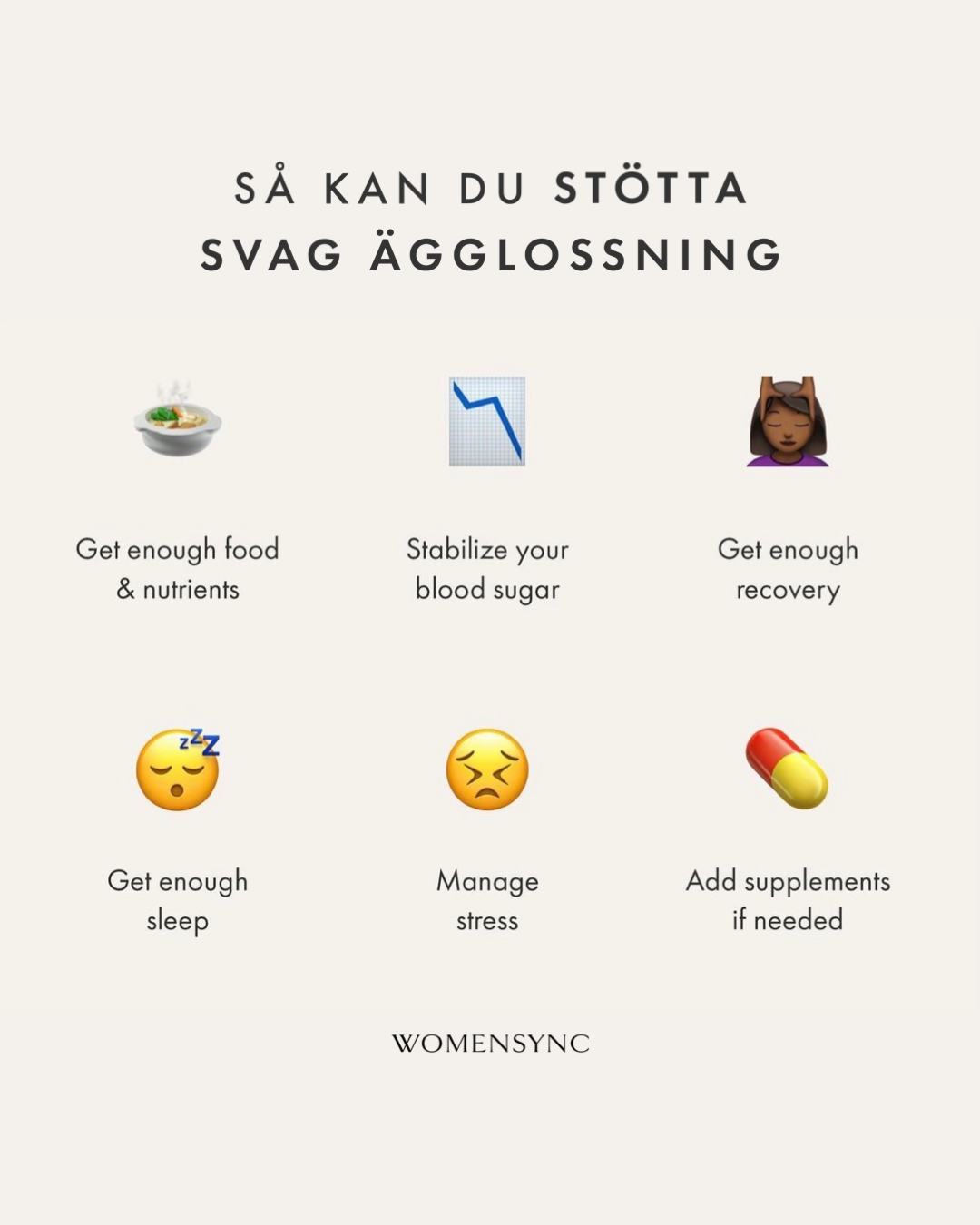What does weak ovulation really mean and what can be done to strengthen it? That's exactly what we're going to delve into in today's post. To understand what it means to have a "weak" ovulation, we first need to understand what ovulation is and why it is important.
Why is ovulation important?
Ovulation is the main event in the menstrual cycle. Without ovulation, we cannot produce sufficient amounts of our beloved sex hormones, estrogen and progesterone (here you can dive deep into estrogen and progesterone - their function, effects and how to best boost them.) which control the menstrual cycle and how we feel, how our body feels and how we experience our everyday life. If we do not ovulate or have a weak ovulation (that is, not a sufficiently qualitative ovulation), it will most likely be expressed in various, not so funny, symptoms during the course of the month.
In other words, a strong and qualitative ovulation is the solution to overcome hormonal imbalances, symptoms such as PMS , a short luteal phase (phase 3), low levels of progesterone, involuntary infertility or repeated miscarriages.
What does weak ovulation mean?
A weak ovulation simply means that your ovulation is not strong or qualitative enough, which can be due to several different reasons. Often it is rooted in the fact that the body feels that it does not have enough resources, in the form of food, nutrition, recovery or sleep to ovulate, or that the body experiences other factors that stress your body such as: caffeine , overtraining , you eat things you cannot tolerate or too many combined stressors (internal and external). When you ovulate weakly or don't ovulate at all, you produce low levels of progesterone, which means you can experience various symptoms during the month. When (if) we experience symptoms during the month, it is often rooted in the balance between progesterone and estrogen (they need to be balanced for us to feel good) - we need to be able to use and clear out estrogen in the right way and we need to have a stable progesterone (thanks to ovulation) and that they are broken down correctly.
Signs of a weak or not so qualitative ovulation can, for example, be expressed in e.g.:
- That your temperature increase after ovulation does not last more than 3 days (up to 10 days actually), which indicates that your corpus luteum is not strong enough and that you are therefore not producing sufficient amounts of progesterone.
- Weak temperature during the luteal phase, which is a sign of weak progesterone. Sometimes it can be the case that the luteal phase is normal (more than 12 days) but that the temperature fluctuates, i.e. goes up and down during the phase, which can also be a sign of weak ovulation.
- Different PMS symptoms due to estrogen being high relative to progesterone (both can be low)
- A short phase 3 (luteal phase). A "normal" luteal phase is between 11-16 days. The luteal phase is always a maximum of 16 days (if the luteal phase is longer, it may be due to e.g. pregnancy or a cyst - always check this)
What could be the cause of weak ovulation?
The reason for a weak ovulation is often rooted in the fact that you do not have enough resources to properly produce your sex hormones or to create a healthy and strong egg. When we talk about resources, we mean which resources in your lifestyle provide the conditions for ovulation.
An important resource is nutrition. You need to get enough energy and nutrients because the food we eat acts as building blocks to produce our hormones and affects the quality of our eggs and thus how we ovulate. When it comes to nutrition, it is also required that you can absorb the nutrients in what you eat and not eat things that you cannot tolerate or that block nutrient absorption. If you suspect nutritional deficiencies, it may be good to do a test for this. We recommend Werlabs Hälsotest XL Plus (Womensync for discount with purchase).
In addition to nutrition, resources are also about how much stress you are exposed to (externally and internally), how much or how hard you exercise, how much recovery you get into your life and how much toxins in your environment and everyday life you are exposed to. For example, if the body is exposed to stress over a long period of time or is exposed to prolonged overtraining or a lot of environmental toxins, the body needs to focus on dealing with these stressors, instead of prioritizing ovulation and fertility.
How do I get a strong ovulation?
The solution to strengthen a weak ovulation is simply about giving the body the resources that provide the conditions to be able to push through a strong ovulation, which we therefore have the opportunity to influence through our lifestyle. In order for the lifestyle changes to have an effect, it is also important to make sure that we do not have any underlying diagnoses such as thyroid problems or stomach and intestinal problems.
By giving the body what it needs in the form of sufficient amounts of food, nutrition, sleep and recovery, it signals to the body that it is safe and that it does not need to focus on survival but has the conditions to focus on fertility. The body has enough resources and building blocks to produce hormones and create healthy eggs.
To summarize how you yourself can improve the conditions for a strong ovulation:
- Eat proper and nutritious food
- Make sure to get enough sleep and recovery
- Reduce stress in your everyday life, physical stress from, for example, overtraining and internal stress
- Reduce or eliminate other stressors such as caffeine, gluten (if you cannot tolerate it)
- Review nutritional deficiencies or underlying thyroid or gastrointestinal issues
To read more about how you can promote ovulation through lifestyle, we recommend you read the following posts:
That's why you want to ovulate
Part I: Everything You Need to Know About Estrogen (And How to Reduce PMS)
Part II: Everything You Need to Know About Progesterone (And How It Can Reduce PMS)
How stress can lead to delayed ovulation and prolonged menstrual cycle

